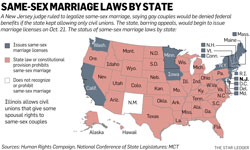The Superior Court of New Jersey, located in Mercer County, made a “historic” decision in the case, Garden State Equality v. Dow where Head Judge Mary Jacobson ordered state officials to begin officiating same-sex marriages as of Oct. 21, 2013.
This decision was 10 years in the making. Lamda Legal and Garden State Equality, New Jersey’s statewide LGBT advocacy organization, represented six same-sex couples and their children. Lamda Legal and Garden State Equality claimed that their clients were harmed because of the unequal civil union system. They claimed that civil unions violate both the NJ Constitution and the 14th Amendment of the U.S. Constitution.
After the landmark decision this past summer in U.S. v. Windsor, the Supreme Court declared the Defense of Marriage Act (DOMA) as unconstitutional. DOMA, a federal law, defined marriage as a union strictly between one man and one woman.
Judge Jacobson declared that the state government is violating New Jersey’s Constitution by denying federal benefits to the couples by not allowing them marry.
In her opinion, Jacobson stated, “The ineligibility of same-sex couples for federal benefits is currently harming same-sex couples in New Jersey in a wide range of contexts” She continued by specifically noting the Family and Medical Leave Act. Judge Jacobson declared that under the current system, “…civil union couples may not access the federal tax benefits that married couples enjoy.”
Finally, Judge Jacobson stated, “Same-sex couples must be allowed to marry in order to obtain equal protection of the law under the New Jersey constitution.”
With that statement, Judge Jacobson was the first state judge to apply the striking down of DOMA under the U.S. v. Windsor decision as precedent for legalizing same-sex marriage in New Jersey. Judge Jacobson accomplished this by using New Jersey’s own legal precedents to make her decision in favor of same-sex marriage.
 This decision was seen as a step forward for New Jersey. Many MU students passionately agreed with Judge Jacobson’s decision.
This decision was seen as a step forward for New Jersey. Many MU students passionately agreed with Judge Jacobson’s decision.
Daniel Roman, a junior political science major and president of the pre-law club stated, “I am extremely proud of my state. A judge used the DOMA ruling as precedent in NJ to finally rule that gay marriage should be legal.”
John Marchetti, a junior business major, also viewed this decision as an advance for civil rights in New Jersey. Marchetti stated, “I am happy that the State of New Jersey is now treating all of its citizens equally. Love is love.”
Before this ruling, New Jersey only allowed same-sex citizens to obtain a civil union. There are fundamental differences between marriage and civil unions. Marriage is a legal commitment between two people. The state and federal government also recognize the marriage between two people.
Heterosexual married couples have 1,138 federal rights. These are protections and responsibilities that are obtained when they sign their marriage license. Some of these federal rights include: Social Security benefits upon death, Workers’ Compensation protections for the family of a worker injured on the job, exemptions from estate taxes when a spouse dies, and even the right to visit a sick or injured loved one and have a say in life and death matters during hospitalization.
Civil unions do not protect the right of the same-sex couples outside of the state. If a same-sex couple that has documentation of a civil union moves to another state, it does not need to be recognized if any state does not consider it legal. There are no federal rights associated with civil unions and only obtains minimal rights and responsibilities as heterosexual marriage, but only at state level. civil unions do not allow couples to file joint tax return nor does it grant homosexual citizens eligibility for tax breaks and protections that the government awards to heterosexual married couples.
There are only four states that still offer civil unions and not marriage to same-sex couples. These four states include New Jersey, Colorado, Hawaii, and Illinois.
Professor Gregory Bordelon, lecturer in political science and sociology department, said, “The Windsor case, decided by the U.S. Supreme Court did not direclty affect state marriage and civil union laws but the Mercer County court analyzed the differences created by the Windor’s case implementation because federal agencies were adjusting to to the DOMA’s repeal by attempting to grant same-sex couples vadility married the same rights as opposite sex couples.”
Bordelon continued, “Those few states with civil unions and domestic partnerships fell through the cracks. The irony is that to grant rights to gays akin to marriage. In 2006, New Jersey may be the springboard for striking down all laws that don’t grant complete marriage equality.”
Professor Noah Lipman, instructor of history stated, “New Jersey was one of the first state’s to recognize civil unions. NJ’s problem was that in recognizing civil unions it carved out a niche and in its most recent decision the state Suprior Court specifically asked state legislature to take the lead rather than having the court do it. The state legislature attempted to do so but could not obtain the votes necessary to override the promised governor’s veto.”
Same-sex marriage has certainly stirred up controversy in America, but it has also become a crucial equality issue. As of right now, New Mexico is the only state that has no laws allowing or banning same-sex marriage. Despite the peaceful protests, same-sex marriage is only legal in 13 states and the District of Columbia. These states include: California, Connecticut, Delaware, Iowa, Maine, Maryland, Massachusetts, Minnesota, New Hampshire, New York, Rhode Island, Vermont, and Washington. If Judge Jacobson’s decision stands, New Jersey will follow suit with the rest of the Northeast and become the 14th state to legally allow same-sex marriage.
Despite the Judge Jacobson’s decision, some New Jerseryans are not as ecstatic about the “historic” news. A strong opponent of this decision is Governor Christie. The Governor has “vowed” that he will personally appeal the ruling all the way up to the New Jersey Supreme Court.
United States Senator from New Jersey Robert Menendez and State Assembly Speaker Sheila Oliver have both urged Christie not to appeal.
Roman identified with Menendez and Oliver by stating, “Unfortunately, Christie has appealed this decision. A large majority now supports marriage equality and it’s time for Governor Christie to follow suit.”
The Christie administration has argued that same- sex marriage is not a state issue. His administration believes it is out of New Jersey’s hands since the only demanding concerns revolve around federal, not state, benefits.
Over a year ago, Governor Christie vetoed legislation that would have allowed same-sex marriage in New Jersey. Christie has made it extremely apparent that he does not believe that same-sex marriage is for the legislators to decide. Instead, he intends to make same-sex marriage an issue that New Jerseryans can vote for or against at the ballots this November.
This issue is not just a controversial issue for America, but also for Governor Christie. The incumbent is up for re-election this year. However, his ambition is not limited to being a two term Governor of New Jersey. Speculation by many political analysts, reporters, and Republicans in general believe he will become a Republican contender for the 2016 presidential election.
Roman stated, “…but of course Governor Christie wants to win the republican nomination for President, so he won’t allow gay marriage to become legal in New Jersey.”
Lipman also commented on Governor Christie’s ambitious future and his stance on marriage equality. Lipman stated, “As for the 2016 nomination battle in the Republican Party, [Christie’s] present stance will sit well with the party’s base conservative voting block.”
Lipman continued, “ It was just several years ago that President Obama, as a state legislator in Illinois, took the position that he was against same-sex marriage. His thinking evolved on the subject as time passed. Governor Christie has always stood for equality in so far as civil unions so he has a position upon which his thinking may evolve as well in the future.”
On one hand, many people are skeptical of that separation of religion and state. Mat Langenberger, a junior business major, does not believe in this separation. Langenberger bluntly stated, “Religion is the epitome of everything that is wrong with this country.” He believes that religion is the only reason why same-sex couples are not legally permitted to be married in “the land of the free.”
On the other hand, other people believe that same-sex marriage is an equality issue that is not dictated by a person’s religion.
Alannah Caulfield, junior psychology major stated, “I was raised Catholic. I was also raised to believe that we are all created equal and should be treated equally. Skin color does not matter, nor gender, so why should sexual preference? We all want one thing in life, happiness.” Caulfirnd continued, “Let everyone live happily, live their way; it is not our business what makes others happy.”
So the question remains, will Judge Jacobson’s decision stand and make NJ the 14th state to legally allow same-sex marriage?
Lipman stated, “Should the Supreme Court of New Jersey uphold the lower court decision it would make NJ the first state to have its judicial system mandate the constitutionality of same-sex marriage based upon the U.S. Supreme Court’s decision in the DOMA case.
However, the lower court ruling was based on NJ’s own constitution.” Lipman continued, “I personally believe the NJ Supreme Court WILL uphold the right of same sex couples to marry in our state relying upon our state constitution.”
IMAGE TAKEN from prospect.org



